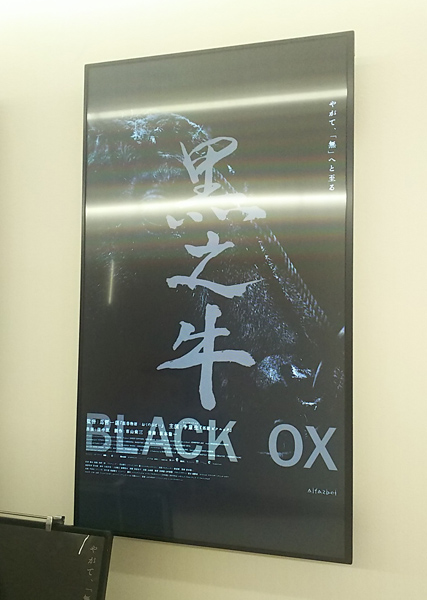"Black Ox" - First Impression |
Read more at in70mm.com The 70mm Newsletter |
| Written by: Shinnosuke Hobo (in70mm.com correspondent, Japan) | Date: 02.11.2024 |
 "Black
Ox" poster on display in Tokyo, 1. November 2024. Picture by
Shinnosuke Hobo "Black
Ox" poster on display in Tokyo, 1. November 2024. Picture by
Shinnosuke HoboI went to the world premiere of "Black Ox" at the current TIFF. (I'm ashamed to say that I didn't know the film was partly shot in 70mm, and only found out from an email from Thomas. I was very honoured to be part of the world premiere of this film. Thank you Thomas !). I won't talk in depth about the film's content, but the way it is told solely through its images is powerful and impressive. I would like to pay tribute to the fact that this was made by a young 40-year-old Japanese director. The standard-size screen and occasional compositions that leave space above the screen may have been influenced by the Polish film "Ida" (2013), also shot in black and white, and the same director's "Cold War" (2018), also shot in black and white. However, most of the compositions are symmetrical, with many one-shot pull shots. There are also some ambitious close-up shots. It is also a strange coincidence that recent American films about cows, "First Cow" (2019) and (not a cow, but a donkey film) "EO" (2022), were also shot in an angle of view similar to standard size. It took about 8 years to make the film and the music by Ryuichi Sakamoto could only be used because he saw a 10-minute promotional film for the film, liked it and the director took the plunge and offered it to him, which he accepted and he has taken on the music, as it is like the work of director Tarr Bela. Whether one finds the film interesting or not will depend on the viewer's sensibilities and taste in cinema, as well as his or her film-viewing track record and career. For me personally, the first half of the film is somewhat boring, but once the black bull comes out, it becomes progressively more interesting and pulls you through to the end. As for the scenes shot in 70mm, the film is divided into nine parts (actually ten), the last part of which is shot in 70mm. It's like the ape-man scene in "2OO1: A Space Odyssey". Anyway, it is definitely a unique film. It is much more likeable than the recent black-and-white 70mm film "Roma" (2018). And it is a must-see for film fans. I was not able to ask him any questions during the Q&A session, but after the screening I was able to speak directly with the director in the lobby. He said he had planned to shoot everything on 70mm, but it never happened because of the difficulty of getting black and white 70mm film. He also didn't know that there was a film festival in Germany that showed 70mm films every year. He said they could screen the films if offered. However, he said that at the moment they only have material for DCP screenings and if it was still good enough, he could participate. (IMDB's 35mm prints are a mistake). He also said that he would like to make a 70mm print if funds are raised. I have not attended the 70mm Film Festival since the Corona disaster, and even now, due to the weak yen and the war, going abroad is expensive and difficult. However, I look forward to seeing you all again. Thank you very much for reading. |
More in 70mm reading: "Black Ox" - The first feature-length film in Japan to use 65mm film (in parts) in70mm.com News Peripheral Vision, Scopes, Dimensions and Panoramas in70mm.com's Library Presented on the big screen in 7OMM 7OMM and Cinema Across the World Now showing in 70mm in a theatre near you! 70mm Retro - Festivals and Screenings |
 • Go to "Black Ox" - First Impression |
|
| Go: back - top -
news -
back
issues Updated 22-01-25 |
